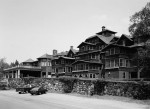Title
This article is an online-only addition to a special section on Juilliard and the military in World War II.
Body
Milton Fink (B.S. ’48, double bass) sent us this reminiscence when we asked Juilliard community members about their links with the military. A shorter version of it appeared in the article “Fighting Battles at Home as Well as Abroad” in the May 2015 Juilliard Journal.
I am a first-generation American, born in 1923. My parents were dirt poor and we suffered through the Great Depression. Despite all of this, my parents skimped so that my older sister had private piano lessons. When I was in elementary school they wanted me to play the mandolin and I took lessons for which my folks paid 25 cents apiece, and I used to walk to the school every day so that I could practice on their instruments. When I was 12, we moved from Brooklyn to Queens, where our apartment was on Jamaica Avenue and the elevated train passed overhead every few minutes and the trolley line was below. I entered Franklin K. Lane H.S. as a sophomore and signed up for the instrumental music program. Seth Vandenberg was my instructor, and at the first session, he offered me a choice of cello, bass, or tuba. I wanted none of these because I had my heart set on the trumpet or sax. Mr. V. prevailed and I was obliged to take the cello. After a few weeks, Mr. V. placed me in the orchestra and after a month or two, he placed me in the first chair of the cello section.
During the spring, Mr. Vandenberg informed us of a special 10-week summer program at Juilliard that consisted of one private lesson per week and daily theory and orchestra. The cost was $50 for the entire program, and I worked after school so that I would not have to ask for assistance. Charles Krane [faculty 1931-43] was my cello teacher at Juilliard and I was hooked except for my desire for the trumpet, so I bought one and took private lessons. I also spent $40 for an old cello. At the end of my senior year I wanted to go to Juilliard full time, but I was not prepared, so after graduation, I got a job lugging steel pipes and Mr. Krane gave me two private lessons per week; he refused any compensation. I then took the audition for Juilliard and was accepted, but I knew that I was going to be drafted, so I joined the New York National Guard and played with it until I was drafted, in 1943.
My basic training as a combat engineer was in Texas. I also became a bugler and eventually we were able to form a drum and bugle corp. I transferred to the air corps with basic training as an air cadet in Florida, and was shipped to Syracuse for academic training. After “washing out” for medical reasons, I was shipped to North Carolina and finally to Fort Dix, N.J., where I became just another bugler. A number of other soldiers and I formed a band, and I played bass; they had all played with Benny Goodman, Tommy Dorsey, and other well-known orchestras. We grew large enough to have actors, comedians, composers, and dancers in our group, and we had a show called Hi Yank written for us. We toured the East Coast and stayed at army camps, where we created quite a situation when we refused to segregate by having our black members eat and sleep in different camps, but unfortunately, we had to obey because we were threatened with court martial! Eventually, the top brass heard about us and we were absorbed by a regular army band and transferred to Lake Placid, N.Y. Unfortunately, even though the Lake Placid Club was taken over by the armed services and used as a recuperation center for wounded veterans, it would not accept our black members. The government still refused to integrate.
While at the Club, we entertained all with shows, dances, small ensembles, and even parades. The entire military band was called out to play a memorial parade when President Roosevelt died [in April 1945]. It was brutally cold, and when I tried to play my sousaphone, my valves froze because of the saliva. I kept on pounding on the valves, but it didn’t help. They didn’t know about antifreeze at the time, and there was nothing you could do.
I was honorably discharged in 1945. The experience I gained while in the service prepared me educationally as well as professionally. I studied string bass with Fred Zimmermann [faculty 1936-67] of the New York Philharmonic at Juilliard and took educational courses in order to receive a B.S. in 1948. I continued playing and serving as the supervisor for high school music in New York City.
Journal editor in chief Susan Jackson spoke with Fink after he sent his reminiscence and found out what he’d been up to since retiring to Massachusetts a few decades ago.
I didn’t realize ’til much later in life how I loved the cello, but when I retired, I thought, “What am I going to do?” and I started taking cello again. I’m still playing, but with difficulty. One of the nerves behind my ear has gotten bad, and I can’t use my right hand, so I use a German bow even though I had been playing a French bow all my life. It was irritating, but what are you going to do? I’m not going to pack it in.





